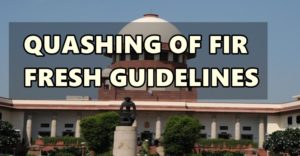In the year 2018 the supreme court of India in its judgment provided the direction not to arrest directly in the offences committed under SC/ST Act. The reason behind was the increasing fake cases day by day against the public.
Thereafter the Hon’ble parliament under Sh. Narender Modi government Pass the bill and again made it non bailable by insertion of new section 18A of the Scheduled Castes and Scheduled Tribes (Prevention of Atrocities) Act, 1989, which reads as follows…….
“18. Section 438 of the Code of criminal procedure not to apply to persons committing an offence under the Act. —Nothing in section 438 of the Code shall apply in relation to any case involving the arrest of any person on an accusation of having committed an offence under this Act.”
“Section 18A. (i) For the purpose of this Act, –
(a) preliminary enquiry shall be required for registration of a First Information Report against any person; or
(b) the investigating officer shall not require approval for the arrest, if necessary, of any person, against whom an accusation of having committed an offence under this Act has been made, and no procedure other than that provided under this Act or the Code shall apply.
(ii) The provisions of section 438 of the Code shall not apply to a case under this Act, notwithstanding any judgment or order or direction of any Court.”
The purpose of insertion of the above section is to nullify the previous direction by the Hon’ble supreme court of India issued in Dr. Subhash Kashinath Mahajan v. The State of Maharashtra & Anr., (2018) 6 SCC 454 which read as follows…….
“83. Our conclusions are as follows:
(i) Proceedings in the present case are clear abuse of process of court and are quashed.
(ii) There is no absolute bar against grant of anticipatory bail in cases under the Atrocities Act if no prima facie case is made out or where on judicial scrutiny the complaint is found to be prima facie mala fide. We approve the view taken and approach of the Gujarat High Court in Pankaj D. Suthar (supra) and Dr. N.T. Desai (supra) and clarify the judgments of this Court in Balothia (supra) and Manju Devi (supra);
(iii) In view of acknowledged abuse of law of arrest in cases under the Atrocities Act, arrest of a public servant can only be after approval of the appointing authority and of a non-public servant after approval by the S.S.P. which may be granted in appropriate cases if considered necessary for reasons recorded. Such reasons must be scrutinized by the Magistrate for permitting further detention.
(iv) To avoid false implication of an innocent, a preliminary enquiry may be conducted by the DSP concerned to find out whether the allegations make out a case under the Atrocities Act and that the allegations are not frivolous or motivated.
(v) Any violation of directions (iii) and (iv) will be actionable by way of disciplinary action as well as contempt. The above directions are prospective.
The validity of the, section 18A of the Scheduled Castes and Scheduled Tribes (Prevention of Atrocities) Act, 1989, has been challenged in PRATHVI RAJ CHAUHAN V/S UNION OF INDIA & ORS and the Hon’ble court upon hearing dismiss the above-named petition and pass following order….
17. The judgment of Mishra, J has recounted much of the discussion and reiterated the reasoning which led to the recall and review of the decision in Subhash Kashinath Mahajan (supra); I respectfully adopt them. I would only add that any interference with the provisions of the Act, particularly with respect to the amendments precluding preliminary enquiry, or provisions which remove the bar against arrest of public servants accused of offences punishable under the Act, would not be a positive step. The various reports, recommendations and official data, including those released by the National Crime Records Bureau12, paint a dismal picture. The figures reflected were that for 2014, instances of crimes recorded were 40401; for 2015, the crime instances recorded were 38670 and for 2016, the registered crime incidents were 40801. According to one analysis of the said 2016 report13, 422,799 crimes against scheduled caste communities’ members and 81,332 crimes against scheduled tribe communities’ members were reported between 2006 and 2016.
18. These facts, in my opinion ought to be kept in mind by courts which have to try and deal with offences under the Act. It is important to keep oneself reminded that while sometimes (perhaps mostly in urban areas) false accusations are made, those are not necessarily reflective of the prevailing and wide spread social prejudices against members of these oppressed classes. Significantly, the amendment of 2016, in the expanded definition of ‘atrocity’, also lists pernicious practices (under Section 3) including forcing the eating of inedible matter, dumping of excreta near the homes or in the neighborhood of members of such communities and several other forms of humiliation, which members of such scheduled caste communities are subjected to. All these considerations far outweigh the petitioners’ concern that innocent individuals would be subjected to what are described as arbitrary processes of investigation and legal proceedings, without adequate safeguards. The right to a trial with all attendant safeguards are available to those accused of committing offences under the Act; they remain unchanged by the enactment of the amendment.
19. As far as the provision of Section 18A and anticipatory bail is concerned, the judgment of Mishra, J, has stated that in cases where no prima facie materials exist warranting arrest in a complaint, the court has the inherent power to direct a pre-arrest bail.
20. I would only add a caveat with the observation and emphasize that while considering any application seeking pre-arrest bail, the High Court has to balance the two interests: i.e. that the power is not so used as to convert the jurisdiction into that under Section 438 of the Criminal Procedure Code, but that it is used sparingly and such orders made in very exceptional cases where no prima facie offence is made out as shown in the FIR, and further also that if such orders are not made in those classes of cases, the result would inevitably be a miscarriage of justice or abuse of process of law. I consider such stringent terms, otherwise contrary to the philosophy of bail, absolutely essential, because a liberal use of the power to grant pre-arrest bail would defeat the intention of Parliament.
21. It is important to reiterate and emphasize that unless provisions of the Act are enforced in their true letter and spirit, with utmost earnestness and dispatch, the dream and ideal of a casteless society will remain only a dream, a mirage. The marginalization of scheduled caste and scheduled tribe communities is an enduring exclusion and is based almost solely on caste identities. It is to address problems of a segmented society, that express provisions of the Constitution which give effect to the idea of fraternity, or bandhutva (बनधधतव) referred to in the Preamble, and statutes like the Act, have been framed. These underline the social – rather collective resolve – of ensuring that all humans are treated as humans, that their innate genius is allowed outlets through equal opportunities and each of them is fearless in the pursuit of her or his dreams. The question which each of us has to address, in everyday life, is can the prevailing situation of exclusion based on caste identity be allowed to persist in a democracy which is committed to equality and the rule of law? If so, till when? And, most importantly, what each one of us can do to foster this feeling of fraternity amongst all sections of the community without reducing the concept (of fraternity) to a ritualistic formality, a tacit acknowledgment, of the “otherness” of each one’s identity.
This article is written by ANIL SRIVASTAV ADVOCATE DELHI HIGH COURT You can read my blog and reach to me on www.advocateanil.com
For taking effective free legal consultation on matrimonial law WhatsApp/call @ 9716757592, 9643831103



